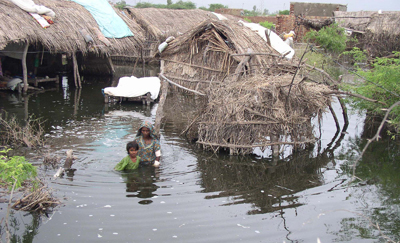The Pakistani media has been critical of the government’s handling of the crisis, particularly of President Asif Ali Zardari, who angered many people by continuing his visit to Britain and France while the country faced a national tragedy. According to an opinion poll conducted by Pakistan’s Dawn News, 82 percent of readers considered the government’s reaction to the disaster inadequate.
In so catastrophic a situation–one in which thousands of villages have been destroyed and lack of sanitation has bred rampant disease–access to information is vital for survivors to know where to obtain food, shelter, medical care and other aid. Access to information is also vital in order to hold the government accountable for how it is handling the situation. Adnan Rehmat, a reader in Islamabad, writes in a letter to the editor of the Daily Times: “At a time when the need for information is the greatest, the limitation on the performance and output of the journalists caused by the floods compounds the problem. The dilemma is that unless the journalists themselves are rid of their flood-caused encumbrances, they cannot perform their basic functions professionally and inform the people.”
To this end, the PFUJ has set up a bank account in Islamabad to collect donations to support Pakistani journalists and help them resume the important work of informing the citizenry. The National Press Club has also said it will assist the families of flood-affected journalists, according to the Daily Times.
Flooding accompanied by torrential rains have taken the lives of more than 1,683 people and injured 8,487; destroyed 6,374 villages and more than 9,893,817 acres of cultivated land, according to the Pakistan Observer.
